

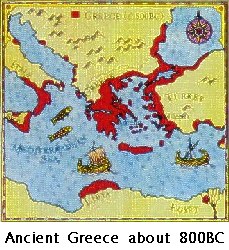 The History of Western Philosophy began in ancient Greece. At this time, Greece was a collection of thriving and squabbling city-states. The ancient Greeks excelled in just about everything. A keen interest in the sciences gave some of them much food for thought. What made them "philosophers" was that they tried to explain the world scientifically. Before this, everything was put down to myths, legends, or the will of the gods.
The History of Western Philosophy began in ancient Greece. At this time, Greece was a collection of thriving and squabbling city-states. The ancient Greeks excelled in just about everything. A keen interest in the sciences gave some of them much food for thought. What made them "philosophers" was that they tried to explain the world scientifically. Before this, everything was put down to myths, legends, or the will of the gods.
|
 THALES
THALESIt all started with Thales. He was the first person to be given the label "wise". His home was Miletus, a busy port on the coast of Asia Minor, now Turkey. Traders passing through Miletus brought new ideas from all over the world. Thales was an astronomer and an expert on managing water. He could navigate ships and re-route rivers. Knowing that water could be liquid, solid, and vapour, he wondered if this could explain how reality changed. Thales decided that water must be the basic ingredient of the universe. Thales looked at the world about him and recognized an underlying and vital life force that was present in everything. He said, "all things are full of gods". |
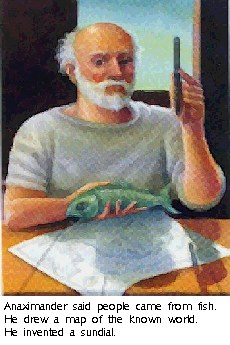 ANAXIMANDER
ANAXIMANDERAnaximander also came from Miletus. He shared Thales' view that there was a basic stuff that glued the universe together. But he didn't agree that is was anything as ordinary as water. He called this substance the "boundless" - something beyond the physical universe, but the source of everything in it. He thought that the world was shaped like a drum and surrounded by this boundless substance. Anaximander also came up with the theory that people had evolved from fish. He reasoned that they must have evolved from something, because he could not see how a human baby could ever have survived if it had suddenly appeared in its present form. |
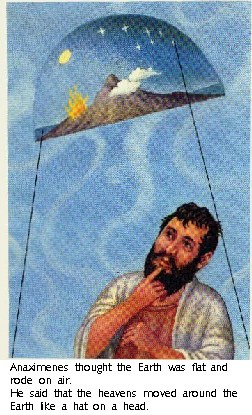 ANAXIMENES
ANAXIMENESAnaximenes was Anaximander's pupil. He looked carefully at the natural world around him, then disagreed with his master. He believed the basic stuff that held everything together was air. He thought that all things were either thick air or thin air. As air got thicker it turned into wind, then cloud, then water, then mud and stones. Fire was just very thin air. Anaximenes reasoned that air was the source of all life, because people have to breathe air to live. He also said people's souls were air. So his ideas about the universe explained both spiritual and material reality. He said, "As our souls, being air, holds us together and controls us, so does wind and air enclose the world". |
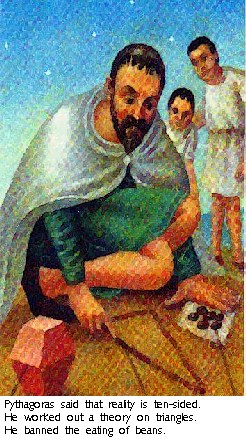 PYTHAGORAS
PYTHAGORASThis great thinker is still famous today for his theorem about triangles. In fact, Pythagoras was obsessed with numbers. He thought reality could be explained by mathematics. He also discovered a relationship between maths and music and came up with a theory about the harmony of the universe. Pythagoras was secretive about his work. He formed a society whose members followed a strict code. One rule was not to eat beans. They saw it as cannibalism, because a cut-open bean looks like the beginning of human life. This had tragic consequences. When chased by a hostile crowd, Pythagoras halted by a bean field. Rather than crush these "human beans", he met his untimely death. |
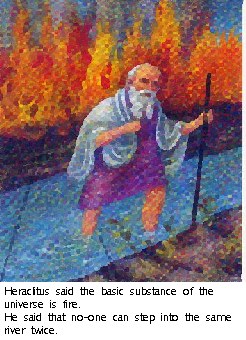 HERACLITUS
HERACLITUSLike Thales, Heraclitus was interested in change. In fact, he saw that nothing in the world stayed the same from one minute to the next. This is what he meant when he said that you can never step into the same river twice. Heraclitus searched for a basic substance to explain this change, and he decided it must be fire. Fire has a stable appearance, yet it changes everything it touches. He saw the world as being in a constant state of creation and destruction. He also recognized a logic behind everything - a kind of cosmic balance. He understood that without winter there could be no spring, and without bad there would be no yardstick for good. |
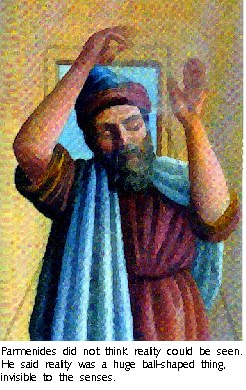 PARMENIDES
PARMENIDESParmenides decided that what his senses told him didn't make any sense. Although his eyes told him that everything changes, his reason told him that this was an illusion. If everything changes, then where did the world come from in the first place? He decided that the world must always have existed because nothing could not suddenly change into something. He reasoned that the world would exist forever, because a something couldn't change into a nothing. Parmenides believed that reality could be understood only by thought. He imagined reality as an invisible, unchanging ball. He also said that the origin of all apparent difference is darkness and light. |
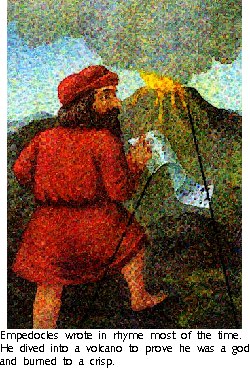 EMPEDOCLES
EMPEDOCLESEmpedocles came from Sicily. He was different from the Greeks before him, because he disagreed that there was one basic ingredient to the universe. He said reality boiled down to the simplest parts of the four elements (fire, air, earth, and water). All change could be explained by the coming together and falling apart of these elements. He said that there are two basic forces in nature that cause this - love and strife. Love brings things together and strife tears them apart. This idea explains both how things can change and how the world can remain the same. His theory on evolution was that only the strong survived. Sadly he did not survive a jump into Mount Etna. |